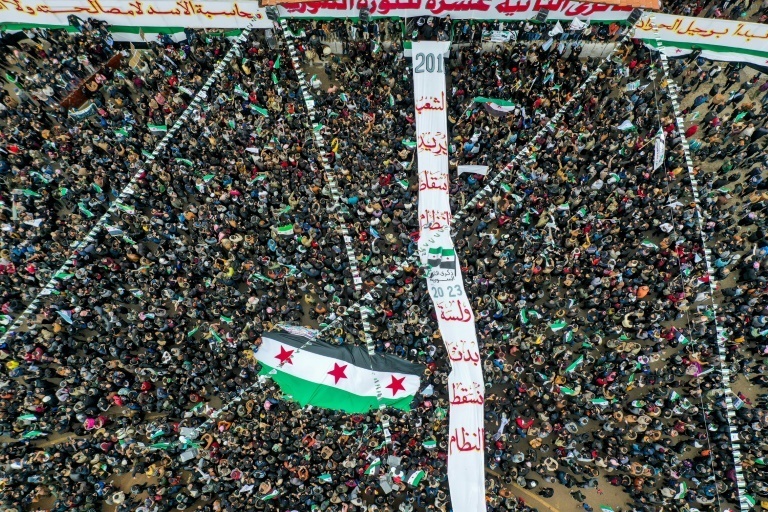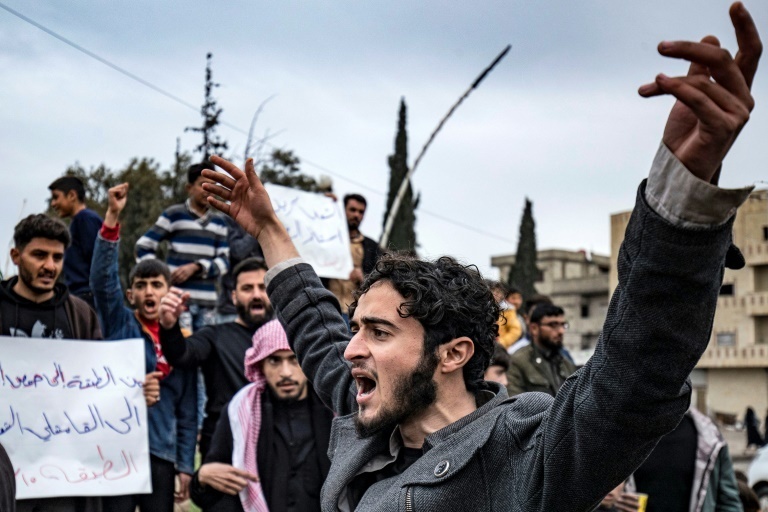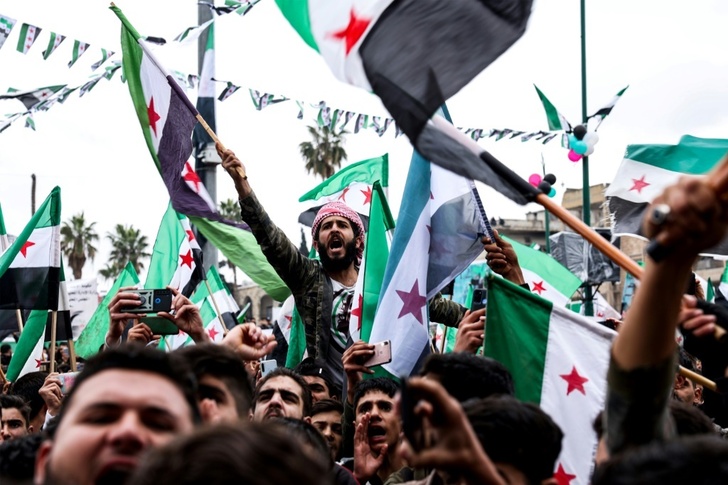Thousands of Syrians demonstrated in the war-ravaged country's rebel-held northwest on Wednesday, marking 12 years since the start of pro-democracy protests and rejecting any international "normalisation" with Damascus.
The brutal repression of the 2011 protests, which began during the Middle East's Arab Spring uprisings, triggered a complex civil war that drew in foreign powers and jihadists.
It has claimed more than 500,000 lives and left millions displaced internally and abroad.
In Idlib city, demonstrators waved revolutionary flags and held banners reading: "The people demand the fall of the regime" and "Freedom and dignity for all Syrians".
The Idlib area is the last major rebel bastion outside the control of President Bashar al-Assad's Russian-backed forces.
"We have come to commemorate the anniversary of the revolution, this great memory in the heart of every free Syrian," protester Abu Shahid, 27, told AFP.
"We are proud of the day we managed to break the barrier of fear and demonstrate against the criminal regime."
The rebel-held areas of Syria's north and northwest, controlled by Islamist groups and Turkish-backed fighters, are home to more than four million people, at least half of whom have been displaced from other parts of the country.
Protests also took place Wednesday in Tabqa, a Kurdish-held area of Raqa province in central Syria, an AFP photographer reported.
On Wednesday in Moscow, Assad was meeting with his Russian counterpart and main ally, Vladimir Putin, whose military support from 2015 changed the course of the war.
That, and assistance from Iran, allowed Assad to win back much of the territory lost earlier.
- 'Against a compromise' -
Analysts say Moscow wants to bridge the diplomatic divide between Syria and Turkey, whose ties were cut soon after the war started.
Both Damascus and Ankara see a common "enemy" in Kurdish groups in northern Syria, which Ankara calls "terrorists" but are backed by Washington.
Experts say Damascus is also looking to break out of its international isolation following the devastating February 6 earthquake that killed almost 6,000 people across Syria.

Demonstrators in Idlib staunchly opposed any moves to normalise Damascus's relations with countries in the region.
"Even if all countries in the world normalise ties with the regime, we will continue and the revolution will continue," Salma Seif, 38, told AFP.
"I am against a compromise with a criminal regime," said another protester, Ali Hajj Sleiman.
"How can I reconcile with the one who is the reason I am in a wheelchair?" he added.
- 'Not sustainable' -
The situation for millions of Syrians in the country remains dire but UN agencies say they need more financial support to help them.
The United Nations Office for the Coordination of Humanitarian Affairs (OCHA) said Wednesday that "15.3 million people across the country" were assessed to be "in need of humanitarian assistance this year", the highest number since the start of the conflict.
But aid is "not sufficient or sustainable", it warned in a statement, calling for "a durable and comprehensive solution to end the conflict in Syria."
The United Nations children's agency UNICEF said the conflict and earthquake had "left millions of children in Syria at heightened risk of malnutrition".

It lamented that its 2023 appeal in Syria was already "significantly underfunded" before last month's disaster.
The World Food Programme also warned that funding gaps risked forcing the UN agency to halt assistance to millions of Syrians.
Without additional financing, "we will have to cut 3.8 million people from the eight million people (receiving assistance) by July," regional director Corinne Fleischer told a briefing in Dubai.
She said food needs were at their highest since the start of Syria's war.
"Six million people were on our list as food insecure around three years ago and now its 12.9 million people," Fleischer said.
ohk/lar/jos/noc/lg/it
© Agence France-Presse
Your content is great. However, if any of the content contained herein violates any rights of yours, including those of copyright, please contact us immediately by e-mail at media[@]kissrpr.com.
Source: Story.KISSPR.com

